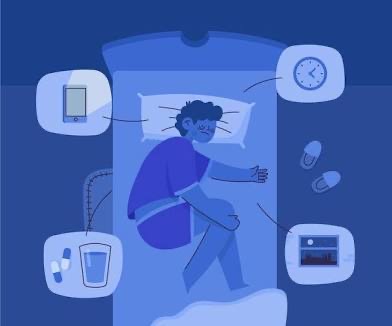In our hyper-connected world, many people are unknowingly caught in the grip of digital insomnia—a sleep disorder brought on or worsened by excessive screen time, especially before bed.
On average, we spend 3–4 hours per day on our phones and devices, often peaking at night when we’re lying in bed trying to wind down. But instead of helping us relax, this habit may be the reason we can’t fall asleep.
Why Can’t You Sleep?
There are a few common reasons we turn to screens at night:
- To distract ourselves from stress or overthinking
- To pass time during periods of sleeplessness
- To finally enjoy some “me time” after a long day
But here’s the catch:
Blue light from screens disrupts melatonin production, your body’s natural sleep hormone.
Endless scrolling overstimulates your brain, making it harder to shut down.
This creates a vicious cycle: the more tired and wired we are, the more we reach for our phones—and the harder it becomes to sleep.
6 Easy Ways to Break Free from Digital Insomnia
Let’s look at simple, science-backed ways to reclaim your rest.
1. ☕ Skip Caffeine After 5 PM
Evening coffee or strong tea may seem harmless, but caffeine can stay in your system for hours. It disrupts your body’s natural wind-down process, making it much harder to fall asleep.
Try this instead: Opt for caffeine-free herbal teas like chamomile, tulsi, or peppermint in the evening.
2. Create a Sleep-Friendly Bedroom
Your bedroom should be a sanctuary—not an extension of your digital life.
Simple changes can make a big difference:
- Keep lighting low after sunset
- Play soft, ambient music or white noise
- Declutter your space to reduce mental stimulation
The goal is to signal to your brain that it’s time to rest.
3. Take a Warm Bath Before Bed
A warm bath naturally relaxes your muscles and mind, helping you unwind after a long day.
Bonus tip: After your bath, try a gentle facial massage using calming oils like lavender or sandalwood for a spa-like wind-down routine.
4. Meditate in a Gadget-Free Zone
Keeping devices out of your bedroom helps reduce mental chatter and overstimulation. Instead, try a short mindfulness meditation focused on your breath and body.
A study published by the NIH found that body-focused meditation improves sleep quality, particularly in those with insomnia.
Even 5–10 minutes of deep breathing can prepare your body for better rest.
5. Read a Book (Not on a Screen)
Old-school books are your best friend before bed. Unlike phones or tablets, physical books don’t emit blue light, and reading helps slow down your thoughts.
Choose something light or comforting—not work emails or thrillers that keep you up all night!
6. Keep Devices Out of Reach
Tempted to scroll through reels or short videos in bed? You’re not alone.
But research shows this habit is linked to poor sleep due to cognitive arousal. According to a recent NIH study, nighttime video consumption overstimulates the brain, delaying sleep and reducing its quality.
Do this instead:
- Place your phone across the room or outside the bedroom
- Use an alarm clock instead of relying on your phone
- Listen to calming audio like bedtime podcasts or nature sounds
Final Thoughts
You don’t have to completely disconnect from the digital world to sleep better—but setting boundaries with your devices is key.
Start small:
- Move your phone out of reach
- Read for 10 minutes before bed
- Set a caffeine cutoff time
Even a few mindful changes can help you reclaim your rest and wake up truly refreshed.



No responses yet